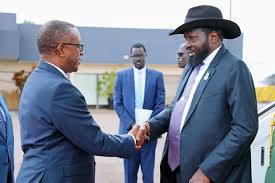APA – South Sudan (Juba) As South Sudan’s president goes on a diplomatic offensive to defuse the flareup in DR Congo, the regional bloc chaired by Salva Kiir finds itself in a fix over resolving the protracted conflict.
The fury of war has picked up and the world’s attention is being gradually drawn to the humanitarian catastrophe unfolding in its wake.
The East African Community (EAC) which had sent troops to DR Congo to help halt M23 rebel advance on several fronts as a member country has since withdrew its intervention force beginning in December 2023.
The region’s military intervention in DR Congo was bungled from the start as the government in Kinshasa led by Felix Tshisekedi wanted the mandate of the regional force to include practical battlefield engagement against M23 rebels who had overran much of the restive east of the country.
The original mandate of the EAC intervention force was to ensure that the December 2022 peace deal had held long enough to allow for substantive war-ending initiatives to begin to bear fruit. Another of its mandate was to facilitate the withdrawal of some 120 armed groups active in the east of the DR Congo. None of these mandates had been adequately met during the regional peacekeepers’ short stint in the country.
The peace deal quickly crumbled as M23 rebels renewed their offensives against DR Congolese troop positions and armed militias continue to run amuck apparently unchallenged in vast swathes of the east.
While regional leaders grudgingly accept that EAC soldiers’ boots on the ground in DR Congo had failed, perhaps a return to more rounds of diplomacy could suddenly blunt the appetite for a protracted conflict which has driven hundreds of thousands if not millions of people from their homes and caused a humanitarian catastrophe the extent of which is still barely known and understood by the rest of the world.
South Sudan’s president Salva Kiir who holds the rotating chair of the East African Community shares with his Rwandan counterpart Paul Kagame, this faith in the potency of injecting new verve into regional diplomacy in an aggressive pursuit of a ceasefire.
The EAC is a regional economic bloc with eight member countries including South Sudan, Rwanda and the Democratic Republic of Congo.
The other members are Burundi, Kenya, Tanzania, Uganda and Somalia which was the latest to be admitted in its fold last November.
In his capacity as regional chair of the bloc, Kiir is on a diplomatic whirlwind tour of EAC member countries in a desperate bid to drum up support for peace not only in DR Congo but also in other conflict-ridden spots in East Africa like Somalia where al-Shabaab militants still carry a potent threat.
Kiir’s ‘partnership for peace enterprise’ with Kagame may be a bit problematic given the piquant distrust with which the Rwandan leader is viewed by Mr Tshisekedi who had repeatedly accused Kigali of backing the M23 and other rebel groups wreacking havoc in his country.
Mr Kagame vehemently beat back those allegations, issuing accusations of his own against Kinshasa over its role in aiding and abetting Rwandan rebels out to oust his government.
Despite several round of talks between the two men brokered by regional and international players to reach an accommodation, this suspicion which appears to be mutual still runs deep and does not look like burning out anytime soon.
Perhaps with a dispassionate appreciation of the broader implications of the DR Congo for the region, Kiir while meeting Kagame in Kigali on Thursday underlined the importance of tackling the root causes of conflict and insecurity in East Africa and warned against letting instability in one country spilling over to other neighbours.
Both leaders believe what happens in the region is determined by how the EAC upholds its integrity and accountability in its functions as a regional bloc that commands the respect of current and future belligerents.
After his election as chair of the EAC last September, the South Sudanese leader had expressed confidence in the bloc’s ability to tackle shared challenges including insecurity in the form of rebel incursions, terrorism and cross border crimes.
But with the DR Congo conflict exacerbating in recent months, Mr Kirr has been prompted to hinge his trust on the largely neglected Nairobi peace process.
He is keen on other regional leaders jumping on board with him and together bring pressure to bear on the DR Congolese bellligerents to cease hostilities and opt for inter-Congolese dialogue.
With M23 fighters appearing to be on the ascendancy once again, Kiir’s gamble with the only peace initiative of note for DR Congo may be facing an uphill battle.
CU/as/APA


